Secure Da Bag
Veteran
Nigerian PM(?) moves to pass bill to protect local industry.



In a statement issued and signed by the spokesperson of the opposition political parties, Barrister Ikenga Imo Ugochinyere and sent to DAILY POST in Abuja on Monday, the body urged lawmakers in the lower chamber to rise against impunity.
The body in the statement alleged that a sum of $10 million was offered by the American Computer Czar, Bill Gates to influence the speedy passage of the bill without recourse to legislative public hearing, a development they averted as anachronistic, adding that the Speaker, Femi Gbajabiamila should be impeached if he forces the bill on members.
The statement read:
“Opposition Coalition (CUPP) has intercepted very credible intelligence and hereby alerts Nigerians of plans by the leadership of the House of Representatives led by Femi Gbajabiamila to forcefully and without adherence to the rules of lawmaking to pass the Control of Infectious Diseases Bill 2020 otherwise known as the Compulsory Vaccination Bill which is proposing a compulsory vaccination of all Nigerians even when the vaccines have not been discovered.
“This intelligence is coupled with the information of the alleged receipt, from sources outside the country but very interested in the Bill, of the sum of $10 million by the sponsors and promoters of the Bill to distribute among lawmakers to ensure a smooth passage of the Bill.
“This will manifest in a wishy-washy public hearing which the promoters still insist on cancelling under the pretext of containment of the spread of the coronavirus. The intelligence is that the House will under whatever guise pass the Bill tomorrow 5th May, 2020 upon resumption.
“The Nigeria opposition rejects the Bill and urges opposition lawmakers in the House of Representatives to confront the Speaker of the House with these facts tomorrow at plenary and resist every plan to illegally pass the Bill.
“We have been informed that the alleged deal on the passage of the Bill was struck during a trip to Austria a few months back while the financial support for the promotion of the Bill was allegedly received last week to mobilize for a push leading to the hurried attempt to pass the Bill by any means necessary.
“Nigerians are reminded that at present, there is no discovered/approved vaccine anywhere in the world and one now begins to wonder why the hurry to pass a Bill for a compulsory vaccine when there is none.
“What if the world eventually does not find a vaccine or cure for coronavirus just like it has not found a cure for HIV AIDS? What is the hurry in passing a Bill based on speculation or is there anything else the leadership of the House would want to tell Nigerians? Is this bill what will stop the mass deaths and infections rising in Lagos, Kano, Abuja, Gombe, Borno, Kaduna, Ogun, Bauchi and indeed all over the country?
“Is this Bill going to revive and grow the economy and reduce hunger and give us more testing kits or bed spaces? Is this Bill going to stop the stealing of palliatives meant for poor and vulnerable Nigerians? Is it true that all these noises for the Bill is all for the alleged $10 million?
“The leadership of the House needs to start speaking now on why the hurry when there are a lot of urgent Bills to be passed which are not being attended to.
“Where is the Bill to make the wearing of face masks compulsory now that the Federal Government has against all wisdom insisted on easing the lockdown and the people have trooped out already without obeying the health regulations that will make them safe?
“Where are the economic revival Bills to protect jobs and vulnerable Nigerian workers whose livelihoods are threatened daily by this pandemic? Where are the Bills to compel the Federal Government to look inwards and encourage emergency research for the manufacture of essentials like test kits, ventilators, Personal Protective Equipment, vaccines, drugs, masks, sanitizers etc
“All opposition lawmakers should prove they are not part of the evil or partakers of the financial inducement and confront Speaker Femi Gbajabiamila to come clean.
“Let all parliamentary rules be dropped and opposition members should turn the House upside down using their parliamentary privileges if that is what it takes to stop this foreign-sponsored Bill.
“Why make a law for a vaccine that has not been discovered? Does it mean that Femi Gbajabiamila and the promoters have an idea of the vaccine and when it will be ready? When nations like Madagascar are making local remedies which is working, APC is making a law to compulsorily inject Nigerians with vaccines our former slave masters have not yet discovered.
“The plan to push the passing of the bill is evil.
“The Nigeria Centre for Disease Control, NCDC did not make any contributions to the drafting of the Bill and has even told Femi Gbajabiamila to suspend the Bill as the timing is very wrong but Mr. Gbajabiamila believes he can secure the silence and acquiescence of the NCDC with all the illegal powers been provided for the NCDC in the Bill hence he still wants to push ahead with it the passage.
“Like we told the Federal Government before, do not bring Chinese doctors, shut our external borders, do not ease the lockdown, do not relax Kano lockdown and they refused to heed to wise counsel preferring to play myopic politics with the lives of Nigerians, today the community transmission is getting worse and it has almost been confirmed that the so called strange deaths in Kano of hundreds of citizens is a result of the COVID-19.
“We are saying loudly again and calling on House of Representatives to suspend this Control of Infectious Diseases Bill and await for proper input and scrutiny after the pandemic and charge all efforts towards giving the needed support to reduce the spread and find a homegrown solution.”
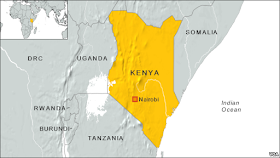
NAIROBI, Kenya (AP) — Somalia’s president has promised his Kenyan counterpart a “thorough investigation” into the deadly crash of a Kenyan plane carrying medical supplies in Somalia, while one Somali official asserts that the aircraft was shot down. Six people on board were killed.
The Kenyan Civil Aviation Authority on Tuesday said the twin-engine plane with African Express crashed Monday afternoon on approach to Bardale “under circumstances we are yet to confirm.”
A projectile fired from the ground hit the plane as it approached the airstrip in Bay region, Ahmed isaq, a local official with the Southwestern State regional administration, told The Associated Press.
The airstrip is a base for the Ethiopian military under the multinational African Union mission, which is combating the al-Qaida-linked al-Shabab extremist group. The group controls parts of rural southern and central Somalia.
There was no immediate comment from Ethiopian authorities Tuesday.
The plane had left Somalia’s capital, Mogadishu, and stopped in Baidoa before going on toward Bardale, the Kenyan statement said. Kenyan authorities said they were in contact with the Somali Civil Aviation Authority.
Somalia’s transport ministry called the crash “a terrible accident” and said the government was investigating.
Somali President Abdullahi Mohamed Abdullahi in a phone call with Kenyan President Uhuru Kenyatta offered his support and condolences, Somalia’s foreign ministry said.

“In 2019, 64 countries, nearly half of them in sub-Saharan Africa, spent more on servicing external debt than on health. Ethiopia spends twice as much on paying off external debt as on health. We spend 47 percent of our merchandise export revenue on debt servicing…
“The dilemma Ethiopia faces is stark: Do we continue to pay toward debt or redirect resources to save lives and livelihoods?”
PM Abiy’s analysis of the urgent need for the cancellation of debt service is relevant to the exacerbating effect of COVID-19 in Africa’s rising food insecurity.

Smoked fish produced in Ghana is sold all over the country and in neighboring Togo – as long as transport routes and borders can remain open for the movement of food to markets. Credit Jane Hahn/Oxfam America
COVID-19 Worsens Food Crisis
In the month from March 30 to April 30, COVID-19 cases in Africa rose from 4,760 to 37,296-800% increase, and the total of deaths from 146 to 1,619-1,100% increase. Experts are legitimately concerned, that millions more may die from hunger and poverty as a result of the needed efforts to reduce the spread of the coronavirus. Closing borders, stay at home orders, loss of income, interruption of supply chains, and disruption of traditional animal migration cycles inauspiciously contribute to amplifying food insecurity.
“If the pandemic worsens, as many as 50 million more people could face a food crisis in the [Sahel} region,” according to Coumba Sow, Food and Agricultural Organization Resilience Coordinator for West Africa in her interview: FAO: COVID19: 50 Million in Sahel Could Face Food Crisis. Coumba Sow reports that across West Africa, 11 million people need immediate food assistance and that this number could rise to 17 million in the period from June to August. She says that it is “crucial to anticipate COVID-19’s impacts on agriculture, food security and the lives of vulnerable women and children. Ensuring that food systems and food supply chains are maintained is one of the most important action to take at national and regional levels.”
The World Food Programme (WFP) projects that the number of people facing acute food insecurity could rise from 135 million to 265 million in 2020 as a result of COVID-19. According to the WFP, five of the countries that had the worst food crisis in 2019 were located in Africa; Nigeria, Ethiopia, Sudan, South Sudan and the Democratic Republic of the Congo.
Arif Husain, economist for the WFP said:
“COVID-19 is potentially catastrophic for millions who are hanging by a thread. It is a hammer blow for millions more who can only eat it they earn a wage. Lockdowns and global economic recession have already decimated their nest eggs. It only takes one more shock—like COVID-19 to push them over the edge.”

Mauritanian herders (Courtesy of UN-FAO)
A New Financial Architecture Required
While debt cancellation is essential, international and federal mechanisms are required to issue i.e.
create new lines of credit to build up nation-wide advanced healthcare infrastructure, which all African nations lack. This endeavor should be part of a much larger undertaking to place African nations on a path to become developed industrialized economies. I discuss the importance of emerging nations to generate physical economic wealth in my earlier article: World Needs New Economic Platform to Fight COVID-19. Trillions of dollars of new credit must become accessible for African nations to address the dearth of infrastructure in energy, roads, railroads, and healthcare, that is literally killing Africans, every day. Successful transformation of African nations requires an urgent focus on nurturing combined manufacturing-agricultural processing industries. Speaking at a Johns Hopkins webinar on April 22, Gyude Moore, former Liberian Minster of Public Works (2014-2018) emphasized that creating manufacturing jobs is essential to transitioning to a more developed economy.
What has been glaringly brought to the surface by the combined COVID-19 pandemic and the malnourishment of Africa’s population is; that the global economic-political system of the last five decades has failed. A new financial architecture is compulsory to save lives and put civilization on the trajectory of progress. This new financial architecture should encompass the following essential missions in Africa:
It is unacceptable in the twenty-first century for every nation not to be equipped with advanced modern healthcare infrastructure. One of the most egregious defects of globalization is that nations have become dependent on imported food from thousands of miles away because it is somehow construed to be cheaper than producing food at home.
- Cancellation of debt
- New credit generation for physical economic growth
- Massive investment in hard infrastructure
- Urgent mobilization to establish modern health infrastructure
- Significant upgrading of manufacturing and agricultural sectors
Nations exist to foster the continuation of a human culture moored to the conception that human life is sacred. There is no equivalency between servicing debt and safeguarding human life. Money really has no intrinsic value. Banks are mere servicing bureaus of an economy. Governments legitimately create credit to generate future physical wealth to benefit their citizens. When borrowing or lending arrangements fail to benefit society then they should be restructured or cancelled. Such financial reorganizations have been achieved many times throughout history.
PM Abiy has brought to the attention of the world, a profound underlying principle that should govern all national and international policy: the promotion of human life is supreme, monetary instruments are not.
***
Why the Global Debt of Poor Nations Must Be Canceled
Delaying the repayments to the Group of 20 is not enough.
By Abiy Ahmed, Prime Minister of Ethiopia. Nobel Peace Prize Laureate, 2019
April 30, 2020, New York Times
ADDIS ABABA, Ethiopia — On April 15, Group of 20 countries offered temporary relief to some of the world’s lowest-income countries by suspending debt repayments until the end of the year. It is a step in the right direction and provides an opportunity to redirect financial resources toward dealing with the coronavirus pandemic.
But if the world is to survive the punishing fallout of the pandemic and ensure that the economies of countries like mine bounce back, this initiative needs to be even more ambitious.
At the very least, the suspension of debt payments should last not just until the end of 2020 but rather until well after the pandemic is truly over. It should involve not just debt suspension but debt cancellation. Global creditors need to waive both official bilateral and commercial debt for low-income countries.
These steps need to be taken with a sense of urgency. The resources freed up will save lives and livelihoods in the short term, bring back hope and dynamism to low-income economies in the medium term and enable them to continue as the engines of sustainable global prosperity in the long term.
In 2019, 64 countries, nearly half of them in sub-Saharan Africa, spent more on servicing external debt than on health. Ethiopia spends twice as much on paying off external debt as on health. We spend 47 percent of our merchandise export revenue on debt servicing. The International Monetary Fund described Ethiopia as being at high risk of external debt distress.
The dilemma Ethiopia faces is stark: Do we continue to pay toward debt or redirect resources to save lives and livelihoods? Lives lost during the pandemic cannot be recovered; imperiled livelihoods cost more and take longer to recover.
Immediate and forceful action on debt will prevent a humanitarian disaster today and shore up our economy for tomorrow. We need to immediately divert resources from servicing debt toward responding adequately to the pandemic. We need to impede a temporary health crisis from turning into a chronic financial meltdown that could last for years, even decades.
Ethiopia must spend an extra $3 billion by the end of 2020 to address the consequences of the pandemic, while our balance of payments is set to deteriorate. Increasing health care spending is essential, irrespective of debt levels, but we have less money on hand, and much of it is due to creditors.
A moratorium on bilateral and commercial debt payments for the rest of this year will save Ethiopia $1.7 billion. Extending the moratorium till the end of 2022 would save an additional $3.5 billion.
Low income countries can use the financial resources freed up by cancellation or further deferment of debt repayments to invest in our battle against the pandemic, from providing necessary medical care to our citizens to ameliorating our financial difficulties.
In October, the I.M.F. reported that the five fastest-growing economies in the world were in sub-Saharan Africa, which includes Ethiopia. In early April, the World Bank reported that sub-Saharan Africa would face its first region wide recession in over 25 years and the region’s economy could shrink by as much as 5.1 percent.
This is not a result of bad policies, mismanagement or any other ill typically associated with developing economies. The recession will be the product of the coronavirus outbreak.
Preventing or at least minimizing the recession is critical to maintaining years of hard-won economic gains across the continent. The current moratorium in bilateral debt collection until the end of the year will help, but it won’t be enough, given the gravity of the challenge we face.
The moratorium must be extended until the coronavirus health emergency is over or canceled altogether. The creditors need to do this unconditionally.
Official bilateral creditors are no longer the principal source of external debt financing for many developing countries. Private-sector creditors, including investment banks and sovereign funds, are. They should play their part in the effort to rescue African economies from permanent paralysis with a sense of solidarity and shared responsibility. It would help avoid widespread sovereign defaults and chaos in the market.
And it would be morally indefensible if resources freed up from a moratorium in bilateral debt collections were to be used to pay private creditors instead of saving lives.
Most of our countries managed to borrow funds on the back of solid economic performance and highly promising and evidence-based development programs and trajectories. Nobody foresaw this promise being derailed by a once-in-a-century event such as the coronavirus pandemic.
Under these circumstances, there is no room for traditional arguments such as moral hazard. Low-income countries are seeking relief not because we squandered the money but because we need the resources to save lives and livelihoods.
It is in everybody’s enlightened self-interest that the borrowers be allowed breathing space to get back to relative health. The benefits of rehabilitation of the economies of the hardest-hit countries will be shared by all of us, just as the consequences of neglect will harm all of us.
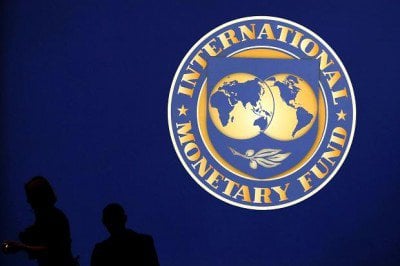
From Kenya, to Egypt and South Africa, governmental leaders, labor unions, community organizations and professional groupings are contributing resources and talents to assist in the educational, testing and mitigation measures being implemented within their respective countries.
Although the number of COVID-19 cases have not reached anywhere near the levels prevalent in the Western countries of Europe and North America, efforts designed to halt such a high rate of infection are proving quite costly for the governments involved. Millions of workers and youth have been idled in the labor markets and the educational sectors.
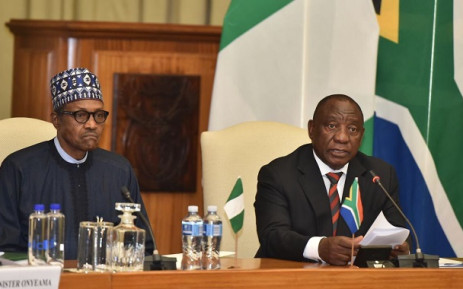
South African President Cyril Ramaphosa and Nigerian counterpart Muhammadu Buhari on state visit
In South Africa, President Cyril Ramaphosa declared a state of emergency in late March, shutting down the country of nearly 60 million people. The president mobilized 3,000 members of the South African National Defense Forces (SANDF) along with 28,000 of healthcare workers in order to enforce the stay-at-home order while carrying out testing for COVID-19 on a mass level.
The South African approach to addressing the pandemic is based upon community outreach, education and testing. Makeshift field centers are being established to pursue active COVID-19 cases for treatment.
An article in the Financial Times says of the South African situation:
“Known as active case finding, the use of community health workers to identify patients with symptoms draws heavily on South Africa’s experience battling tuberculosis and HIV. It differs from the approach of most European governments that have relied on citizens coming forward for tests and then tracing their contacts. John Nkengasong, director of the Africa Centers for Disease Control and Prevention, has lauded South Africa’s aggressive strategy but has warned that Africa overall needs to test more.”
For an underdeveloped country which was liberated from apartheid colonialism 26 years ago, the government led by the African National Congress (ANC) has been able to mount an impressive campaign utilizing the military, media outlets and the medical system to work vigorously towards limiting the crisis. At the end of April the country shifted from level 5 to 4, allowing more movement during certain times of the day.
According to the same above-mentioned report:
“South Africa has increased its level of testing to more than 10,000 tests a day. All the while the number of positive tests has remained consistent at about 3 per cent, a sign that while infections are growing they are not outpacing efforts to find them.”
These extraordinary efforts of course require resources of an enormous magnitude. The outreach project is taking place at a time of high levels of unemployment and declining values for the national currency.
African countries are limited in the cash reserves available to governments to address crises of this magnitude. Some of these states have turned to the International Monetary Fund (IMF) for loans running the risk of further deepening the historical debt burden which has been a major impediment to development since the 1960s.
The IMF and Responses to African States: Sudan and Zimbabwe
In the Republic of Sudan there has been tremendous political and economic upheaval over the last 15 months. A general strike and widespread unrest from December 2018 to April 2019 resulted in a military coup against former President Omar Hassan al-Bashir.
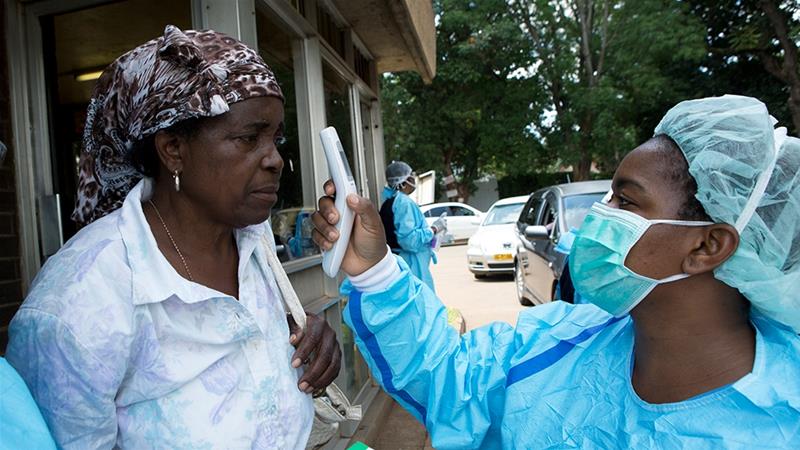
Zimbabwe screening by healthcare workers for COVID-19
A coalition of political organizations and the military have established a Sovereign Council which is governing the country under an interim Prime Minister Abdalla Hamdok.
The new government has made serious attempts to stabilize the country and position the transitional regime to receive financial assistance from international finance capital.
Sudan has received pledges from Saudi Arabia and the United Arab Emirates (UAE) aimed at assisting the oil-rich nation during its transition process. However, the IMF, after meeting with leading Sudanese officials, refused to grant loans to the country. The decision related to the denial of funds took place in December 2019, months before the COVID-19 pandemic threat in Africa.
Under the administration of ousted President al-Bashir, Khartoum was designated as a “state sponsor of terrorism.” Al-Bashir and other leaders within his government were also wanted on criminal charges by the International Criminal Court (ICC) over allegations of human rights violations and genocide in relationship to their efforts designed to suppress a rebellion in the western Darfur region of the country.
The IMF wrote in its summary of their decision to deny resources to the country that:
“Sudan is in debt distress and is eligible for debt relief under the Heavily Indebted Poor Countries (HIPC) Initiative. U.S. sanctions on trade and financial flows were revoked in October 2017, but Sudan remains on the state sponsors of terrorism list (SSTL), which blocks progress toward HIPC debt relief and the clearance of debt arrears. Moreover, the large external debt and arrears hinder access to external financing and weigh heavily on development. The team welcomes the authorities’ engagement with international partners to secure comprehensive support for debt relief and the delisting from SSTL, which would pave the way for foreign investment and financing for growth and poverty reduction. The team also welcomed Sudan’s efforts to strengthen cooperation with the IMF on policies and payments.”
Therefore, despite the dire economic and social conditions in Sudan which the IMF acknowledges, they cannot make loans to the interim government due to issues which arose during the previous administration. The notion of the SSTL is a U.S. construct while the IMF and the World Bank are based in Washington, D.C. Even with the advent of COVID-19, the IMF has not altered its decision in regard to Sudan.
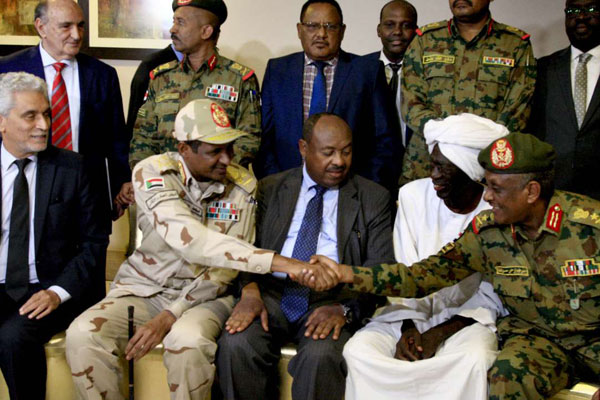
Sudan agreement signed on July 5, 2019 by TMC and FFC along with African Union mediator
At the same time in the Southern African state of Zimbabwe, which has also been under the sanctions regime of Washington and other imperialist centers, has as well been denied assistance from the IMF. Zimbabwe President Emmerson Mnangagwa beginning in March mobilized the country in order to contain the spread of COVID-19.
A delegation from the IMF issued a report on the country in February saying that the Zimbabwe African National Union, Patriotic Front (ZANU-PF) government had not met the necessary criteria to acquire loans. The IMF cited previous debt arrears to financial institutions and the ongoing problems of national debt along with currency stabilization.
This IMF report on Zimbabwe reads in part saying:
“Directors stressed the need to address governance and corruption challenges, entrenched vested interests, and enforcement of the rule of law to improve the business climate and support private‑sector‑led inclusive growth. Such efforts would be instrumental to advance reengagement efforts with the international community and mobilize the needed support. They noted with regret that the Staff‑Monitored Program was off‑track and underscored the importance of continued engagement between the Fund and the authorities, including through technical assistance, policy advice and other innovative ways, to help immediately stabilize the economy and address the humanitarian crisis.”
Zimbabwe came under western sanctions due to a radical land reform program initiated by the parliament and the national government under former President Robert Mugabe two decades ago in 2000. The land was returned to the African people whom were expropriated by European settler-colonialism during the late 19thand 20thcenturies. After independence in 1980, the ruling ZANU-PF party waited for twenty years for the British and U.S. governments to make good on their promises made during the Lancaster House negotiations beginning in 1979.
The Lancaster House talks between the national liberation movements and the colonialists led to an agreement on the terms of national independence. Yet the imperialists states refused to provide compensation to the settler-colonial minority in order to facilitate the transferal of land.
Although the IMF recognized the attempts made by the current Mnangagwa administration to re-engage with the imperialist states, there would not be any assistance forthcoming. These conditions are ultimately aimed at the further impoverishment and destabilization of Zimbabwe under ZANU-PF.
Strategic Questions and the Need to Break with the IMF
Undoubtedly the African Union (AU) member states must break with the IMF and the World Bank in order to release the economic potential of the region. The problem of IMF loan conditionality is not a new one on the continent.
Numerous states since the post-independence era have been strangled by IMF/World Bank policies. The measures required by these Washington-based financial institutions serve to heighten tensions between governments and their people as well as hampering the construction of sound state structures needed for national infrastructural development.
This pattern is obviously continuing in the era of COVID-19. Although the IMF has announced aid to certain African governments, others are excluded. These policies could easily create divisions among various states in the scramble for resources to address the looming healthcare and socioeconomic crises.
The U.S. and other imperialist countries became wealthy and dominant due to their exploitation of African people, resources, land and waterways. Only the total liberation of the African people from capitalism and imperialism can provide a path towards effectively addressing the challenges of the contemporary period.

5 May 2020
Compulsory Vaccination in Africa: Bill Gates Allegedly Offered Nigeria House of Representatives $10 Million Bribe for Speedy Passage of Compulsory Vaccine Bill: CUPP Opposition Party
By Samson Atekojo Usman
This article is based on a statement yet to be confirmed of Nigeria’s opposition party CUPP.
Compulsory vaccination in Africa’s most populated country would set the stage for a vaccination program for the entire continent.
***
The Coalition of United Political Parties (CUPP), on Monday, alleged that it has intercepted a human intelligence report that the Nigeria House of Representatives leadership was poised to forcefully pass the compulsory vaccine bill without subjecting it to the traditions of legislative proceedings.
Link:
Bill Gates offered House of Reps $10m bribe for speedy passage of compulsory vaccine bill – CUPP alleges - Daily Post Nigeria